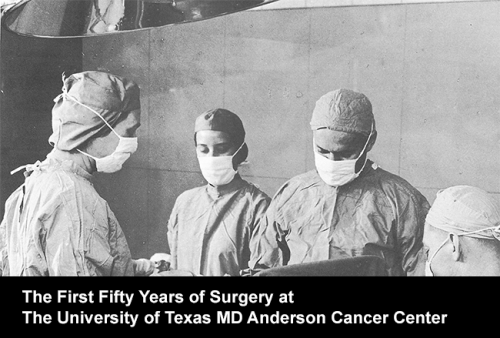

Chapter 11: Unique Anesthesia Challenges with Head & Neck Cancer Surgery, Anesthesiology Staff Composition, and Sterilization Methods in the 1970’s
Files
Description
Dr. Byers relates the practice of anesthesiology in the 1970’s, unique head & neck cancer patient airway problems to overcome, and anesthesiology staff composition. He then talks about the use of ultraviolet (UV) and flash instrument sterilization methods, and the latter’s introduction to MD Anderson by Dr. R. Lee Clark.
Identifier
ByersR_01_2019014_C11
Publication Date
10-14-2019
Publisher
The Historical Resources Center, The Research Medical Library, The University of Texas MD Anderson Cancer Center
City
Houston, Texas
Interview Session
Topics Covered
The Univeristy of Texas MD Anderson Cancer Center - An Institutional Unit; Devices, Drugs, Procedures; Obstacles, Challenges; The History of Health Care, Patient Care; Technology and R&D
Creative Commons License

This work is licensed under a Creative Commons Attribution-Noncommercial-No Derivative Works 3.0 License.
Disciplines
History of Science, Technology, and Medicine | Oncology | Oral History | Surgery
Transcript
Robert Byers, MD:
That was their thing. They would have five nurses and one anesthesiologist. And they would start the case and the anesthesiologist would rotate around, see how things were going.
Robert Byers, MD:
One thing, Bob, that I remember when I came is people were still flashing instruments. Could you tell me about the genesis of that and the rationale for why instruments were being flashed?
Robert Byers, MD:
That’s interesting that you bring that up because it kind of gets lost in the shuffles. Clark brought that with him. And he felt that those instruments were contaminated by the cancer. And so when you took a hemostat or whatever, and you gave it back to the nurse, she threw it in a pile over here which was going back to the autoclave. And we’d come back in and it’d all be—and he thought that was a cancer—
Charles Balch, MD:
So that started with Lee Clark. And had been done for years.
Robert Byers, MD:
Yeah, and he also put ultraviolet on the back table.
Charles Balch, MD:
Oh yes.
Recommended Citation
Byers, Robert MD and Balch, Charles M. MD, "Chapter 11: Unique Anesthesia Challenges with Head & Neck Cancer Surgery, Anesthesiology Staff Composition, and Sterilization Methods in the 1970’s" (2019). History of Surgery - Interview Chapters. 22.
https://openworks.mdanderson.org/surgeryhist_interviewchapters/22
Conditions Governing Access
Open



